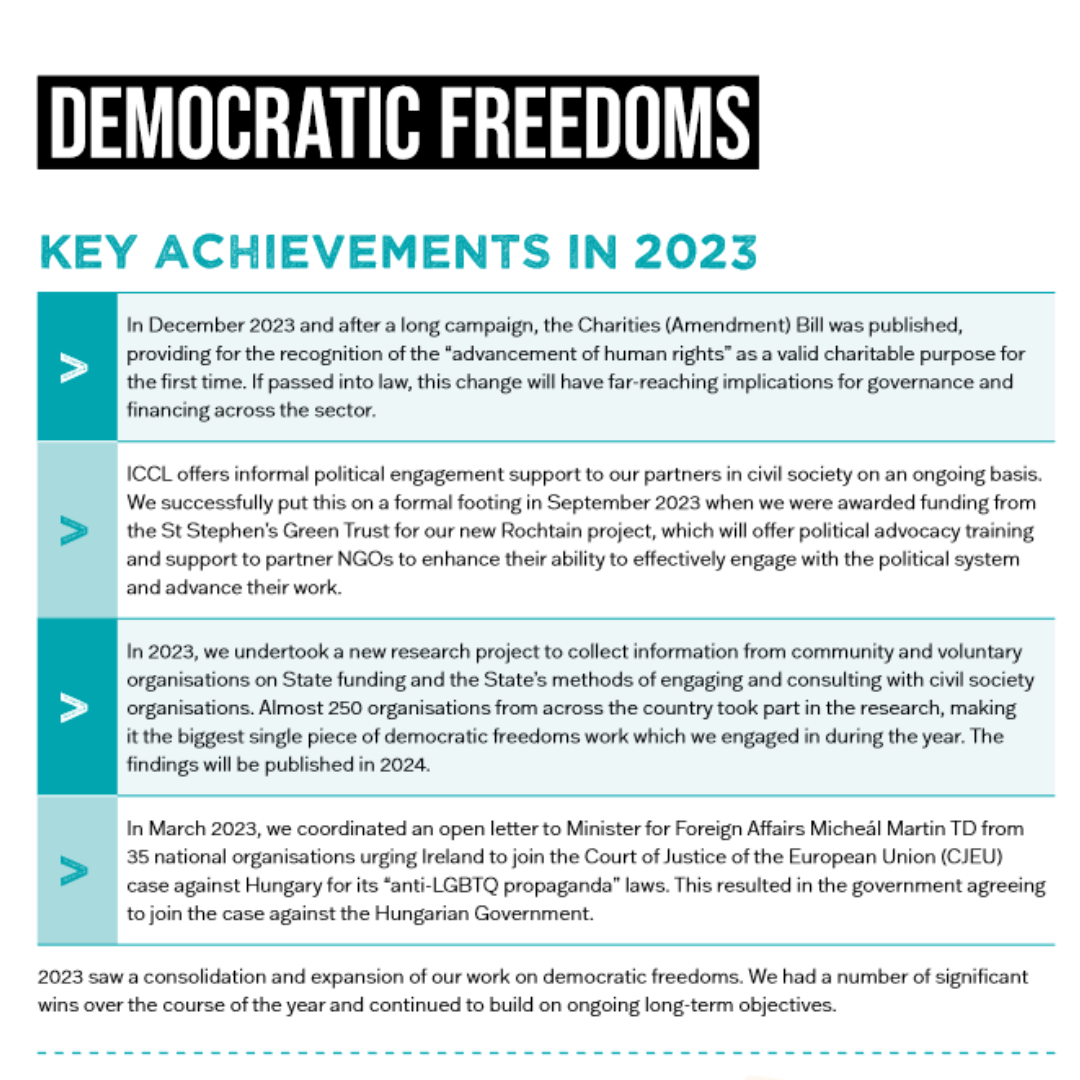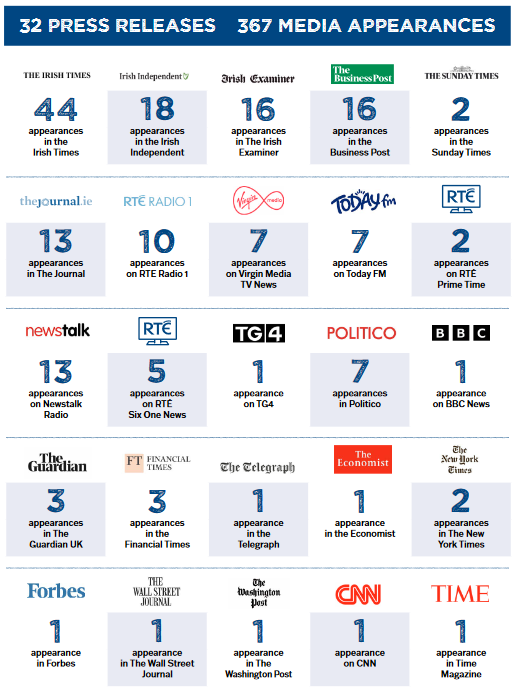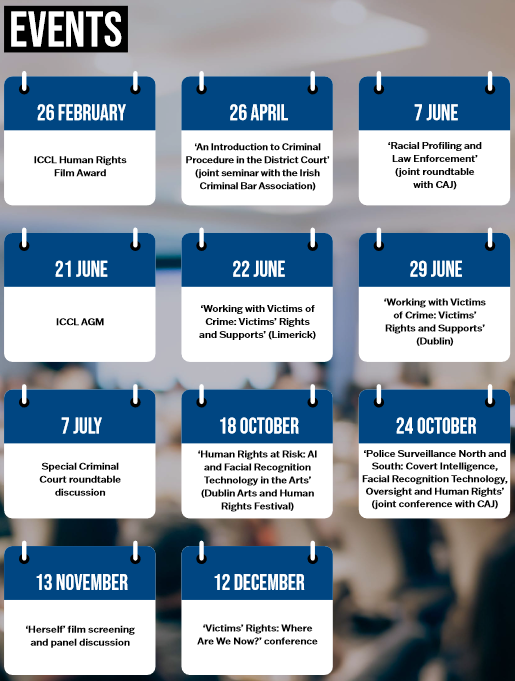The Irish Council for Civil Liberties has published our annual report for our work and finances for 2023. We continued to expand our areas of work, including the launch of Enforce, a new unit of ICCL which advocates, investigates, and litigates to protect human rights in the digital era.

ICCL had a number of key achievements in the area of the Administration of Justice in 2023. We significantly expanded our work on policing reform with the appointment of a dedicated Policing and Justice Policy Officer, and the launch of our 'Policing for Peace' programme, a North-South collaboration with our colleagues at the Committee on the Administration of Justice (CAJ) on policing reform issues.
ICCL also consistently made the case for the right of people to peacefully protest in defence of their views, while emphasising that the right to protest does not include the use of violence or intimidatory tactics against others. We pushed back against knee-jerk responses to the issue of protest, which included draft legislation to prevent protest within 200 metres of homes; suggestions to use the Offences Against the State Act to target intimidation; and proposals to equip Gardaí with facial recognition technology, water cannons and other dangerous crowd control and surveillance weapons.
In response to the publication of the majority and minority reports of the Independent Review Group into the Offences Against the State Acts, we hosted a roundtable event on the Special Criminal Court with speakers including Fionnuala Ní Aoláin, then UN Special Rapporteur on Counter-Terrorism and Human Rights.
We also successfully campaigned, along with Digital Rights Ireland and a range of academic experts, against the Minister for Justice introducing Facial Recognition Technology (FRT) for Gardaí by way of a last-minute amendment without any pre-legislative scrutiny or democratic debate. The Minister also abandoned her plan to introduce live FRT. Instead, she announced she would bring in a standalone piece of legislation concerning FRT.
The Judicial Appointments Commission Act 2023 was signed into law on 8 December, reflecting key ICCL recommendations and finally addressing a longstanding ICCL goal of establishing a more independent systems of appointing judges.

ICCL continued our work on equality and discrimination, campaigning against hate crime and extreme hate speech, and chairing the Coalition Against Hate Crime, shaping the public and political discourse around the hate crime and incitement to violence or hatred legislation.
We welcomed the publication of the review of abortion services by barrister Marie O’Shea in April and continued to advocate as part of the Abortion Working Group for the recommendations to be implemented in full.
We restated our continuous support and allyship to the trans community, being active members of the Trans Equality Together Coalition and taking part in the 2023 Trans Rights Convening organised by the International Network of Civil Liberties Organisations (INCLO) along with two trans rights advocates.
ICCL also worked with Intersex Ireland to ensure a new question on variations of sex characteristics is included in the next Census to fill the existing data gap on intersex people in Ireland.

2023 saw a consolidation and expansion of our work on democratic freedoms. We had a number of significant wins over the course of the year and continued to build on ongoing long-term objectives.
ICCL offers informal political engagement support to our partners in civil society on an ongoing basis. We successfully put this on a formal footing in September 2023 when we were awarded funding from the St Stephen’s Green Trust for our new Rochtain project, which will offer political advocacy training and support to partner NGOs to enhance their ability to effectively engage with the political system and advance their work.
In December 2023 and after a long campaign, the Charities (Amendment) Bill was published, providing for the recognition of the “advancement of human rights” as a valid charitable purpose for the first time. If passed into law, this change will have far-reaching implications for governance and financing across the sector.
In 2023, we undertook a new research project to collect information from community and voluntary organisations on State funding and the State’s methods of engaging and consulting with civil society organisations. Almost 250 organisations from across the country took part in the research, making it the biggest single piece of democratic freedoms work which we engaged in during the year. The findings were published in 2024.
In March 2023, we coordinated an open letter to Minister for Foreign Affairs Micheál Martin TD from 35 national organisations urging Ireland to join the Court of Justice of the European Union (CJEU) case against Hungary for its “anti-LGBTQ propaganda” laws. This resulted in the government agreeing to join the case against the Hungarian Government.

ICCL launched Enforce in 2023 to investigate, litigate, and advocate to protect human rights in the digital age. By 2030, we will push technology back towards democratic value.
In November, we published Europe’s Hidden Security Crisis and America’s Hidden Security Crisis, major investigations revealing a widespread trade in RTB data about sensitive European and U.S. personnel that exposes them to blackmail, hacking and compromise, and undermines the security of their institutions. Our research was decisive in shoring up the Biden Administration’s tough posture against Big Tech.
Following a 16 month process, our complaint to the European Ombudsman against the European Commission’s failure to monitor how Ireland enforces the GDPR triggered a Europe-wide overhaul in January 2023. The European Commission has
now committed to start monitoring the progress of all large-scale GDPR investigations across Europe.
Legislators across the political spectrum in the European Parliament and European Commission officials have come to trust our technical expertise on artificial intelligence. This unique position let us significantly improve the flawed draft law of the EU Artificial Intelligence Act. The European Commission fixed technical errors we highlighted, and the European Parliament voted to include almost all of our proposed improvements in its redraft of the law.
After a year-long process at the African Union, we secured two important measures in the African Union’s new Guidelines for Elections and Digital Media. First, a ban on recommender systems based on intimate data about people being on by default. Second, a ban on online advertising technology that exposes voters to profiling and manipulation. The Guidelines were unanimously voted by all electoral authorities in the African Union in November, and are a world-first.




